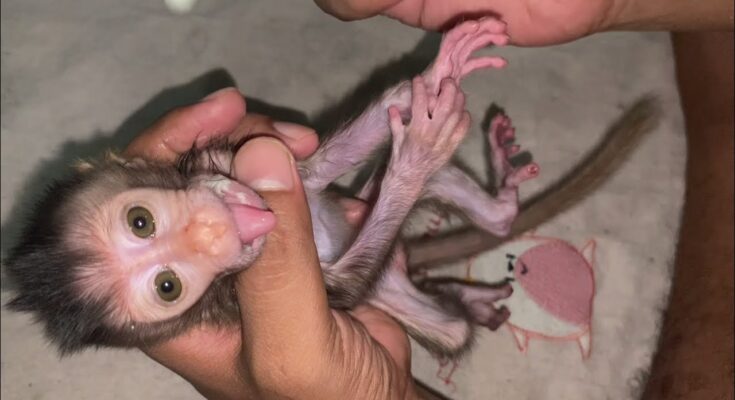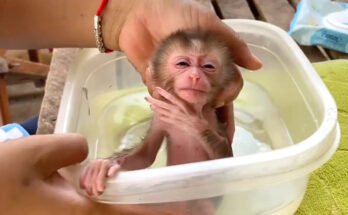Baby monkeys are adorable creatures, but feeding them requires knowledge, patience, and responsibility. If you’re considering feeding a baby monkey, whether in the wild or as a pet, you must ensure you provide the right nutrition for its healthy growth. In this guide, we’ll explore everything you need to know about feeding a baby monkey safely and correctly.
Understanding a Baby Monkey’s Diet
Baby monkeys, like human infants, rely on their mother’s milk for essential nutrients during their early weeks. If you’re responsible for feeding one, you need to replicate this diet as closely as possible.
1. Newborn to 3 Months: Milk-Based Diet
- A baby monkey’s primary source of nutrition is milk. If the mother is unavailable, you can use specialized primate milk replacers or goat’s milk, as cow’s milk may be too harsh for their digestive system.
- Feeding frequency: Every 2–3 hours.
- Use a soft nipple bottle to mimic natural nursing.
2. 3 to 6 Months: Gradual Introduction to Soft Foods
- Begin incorporating soft fruits like bananas, papayas, and mangoes.
- Mashed vegetables such as sweet potatoes and carrots can also be added.
- Continue with milk feedings but reduce the frequency as solid foods become a larger part of their diet.
3. 6 Months and Beyond: Transition to Solid Foods
- Introduce a variety of fresh fruits, leafy greens, nuts, and seeds.
- Small portions of cooked rice and boiled eggs can provide additional protein.
- Avoid processed foods, sugary treats, and anything toxic like avocados, chocolate, or onions.
Feeding Tips for a Healthy Baby Monkey
- Hydration is crucial – Provide clean, fresh water at all times.
- Monitor digestion – If you notice diarrhea or constipation, adjust the diet accordingly.
- Avoid human food – Spices, artificial flavors, and fast food can harm a monkey’s health.
- Social feeding – Monkeys learn from their environment, so allowing interaction with other primates (if safe) can help them develop healthy eating habits.
Important Considerations Before Feeding a Baby Monkey
- Legal Restrictions: Keeping or feeding a monkey as a pet is illegal in many countries without proper permits.
- Ethical Concerns: Wild monkeys should ideally be cared for by professionals or wildlife rehabilitation centers.
- Long-Term Commitment: Baby monkeys grow into highly active and social animals that require specialized care.
Conclusion
Feeding a baby monkey is a delicate process that requires proper knowledge and responsibility. If you ever find an abandoned or injured baby monkey, it’s best to contact wildlife experts who can provide the appropriate care. If you’re legally permitted to care for one, always prioritize a natural, balanced diet to support its growth and well-being.
Baby Monkeys: Nature’s Adorable Wonders

Baby monkeys are some of the most charming creatures in the animal kingdom. Their playful energy, intelligence, and curiosity captivate anyone lucky enough to watch them. Let’s explore their world, fun facts, and how they grow into amazing primates!
1. The Early Life of a Baby Monkey
Baby monkeys are born small but incredibly alert. Within weeks, they begin clinging to their mothers, learning essential skills for survival.
2. Playtime is Serious Business
For baby monkeys, play is much more than fun—it’s how they learn about their environment, develop social skills, and build strength. Watching them swing, climb, and tumble is pure joy!
3. Communication and Emotions
Even as babies, monkeys display a wide range of emotions through facial expressions and sounds. They cry when hungry, coo when content, and show affection through cuddling.
4. How They Learn and Adapt
Baby monkeys are quick learners. They mimic their elders, picking up essential skills like foraging, grooming, and even problem-solving!
5. Why We Love Baby Monkeys
Their big, curious eyes, playful antics, and intelligent behavior make baby monkeys irresistibly lovable. Whether in the wild or as part of conservation efforts, these little primates remind us of the joy and wonder in nature.
Final Thoughts
Baby monkeys teach us about resilience, curiosity, and the importance of connection. Observing their growth and development is a beautiful reminder of the wonders of life.



